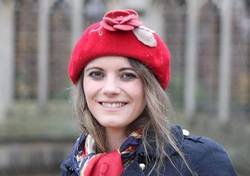Aluminum instead of Platinum - Presentation of the Clara Immerwahr Award to Dr. Rebecca Melen / Invitation
05 February 2016
The Cluster of Excellence, "Unifying Concepts in Catalysis" (UniCat) will present Dr. Rebecca Melen of Cardiff University, UK, the Clara Immerwahr Award on 12 February 2016 at the Technische Universität Berlin.
The chemist is being honored for her outstanding contributions to the field of inorganic chemistry in particular for the use of main group elements instead of transition metals for catalytic reactions.
The main group element aluminum is the most abundant metal in the earth’s crust. Therefore it is inexpensive and environmentally acceptable. The hydrogenation of chemicals is an important issue for synthesizing pharmaceuticals and for producing foods e.g. margarine. The development of highly active transition metal free hydrogenation catalysts is an attractive research field of increasing interest.
Please draw attention to the Clara Immerwahr Award Ceremony in your media. Journalists are cordially invited:
Time: Friday 12th February 2016, 2:00 pm
Location: TU Berlin, Main Building, Atrium (Lichthof), Straße des 17. Juni 135, 10623 Berlin, Germany
The event will be conducted in English.
Agenda:
Welcoming remarks by Prof. Dr. Christian Thomsen, TU Berlin President, and by Prof. Dr. Matthias Driess, Chair of UniCat
Laudation by Prof. Dr. Thomas Braun, Institute of Chemistry, HU Berlin
Presentation of the Clara Immerwahr Award
Presentation by Dr. Rebecca Melen, 2016 Clara Immerwahr recipient: “Main Group Catalysis: A Transition Metal Alternative?”
Guest presentation by Prof. Dr. Katharina Al-Shamery, Carl von Ossietzky Universität Oldenburg: “Titania”
Dr. Rebecca Melen
Rebecca Melen’s primary area of research is the use of Lewis acids and bases as catalysts for organic synthesis. Rebecca Melen aims to synthesize chiral catalysts from renewable feedstocks. These chiral catalysts enable the route to enantiopure products. Enantiomers have molecular structures that are mirror images of each other. Chemicals of only one enantiomer are difficult to synthezise chemically, but very important for drug synthesis.
Rebecca Melen is just 30 years old and can already claim 29 publications in scientific journals and contributions to 5 books. After her PhD from the University of Cambridge, she went as a postdoctoral researcher to Toronto University for one year. Subsequently, she received a prestigious Humboldt fellowship for a research stay at Heidelberg University in Germany. Since 2014 Rebecca Melen has been teaching and doing research at Cardiff University, UK.
Rebecca Melen will use the 15.000 € prize money for joint research projects with the Cluster of Excellence UniCat. The aim of the planned work is to synthezise aluminum catalysts having chiral ligands. Thereafter the catalysts will be tested in asymmetric hydrogenations. This will be done in cooperation with Prof. Martin Oestreich and Prof. Matthias Driess from Technische Universität Berlin.
Professor Ulla Wollenberger of the UniCat Committee for the Clara Immerwahr Award says: “We are glad that with Rebecca Melen we have found a worthy recipient who has already published a large number of widely regarded research papers. We are convinced that the award will initiate incredibly fruitful collaborations in the area of catalysis”.
On receiving the award, Dr. Melen said: “I am thrilled to hear that I have been honored with the Clara Immerwahr Award. The award provides a great opportunity to study at the UniCat Cluster of Excellence in Berlin where I will explore some new avenues of research. As a previous Humboldt Fellow in Heidelberg, I will enjoy the opportunity to engage with colleagues at UniCat and look forward to immersing myself in the local German culture and developing my language skills further.”
The Clara Immerwahr Award is conferred by the Cluster of Excellence UniCat to honor an exceptional young female scientist in the field of catalysis, and invites the recipient to cooperate with UniCat working groups. The award will be presented in 2016 for the fifth time. It sets an example for the promotion of excellent female scientists and is a measure taken by the Cluster in order to promote women. Further activities undertaken by the Cluster to advance gender equality include, for example, gender sensitivity seminars, professionalization of UniCat members, the establishment of guest scientist programs for female scientists, and the creation of Success Teams.
The annual Clara Immerwahr Award includes 15,000 Euro and is publicized internationally. This year the prize was mainly financed by Siemens. The prize is given in honor of Dr. Clara Immerwahr, who in 1900 was the first German woman to receive a doctorate for her work in physical chemistry from the Universität Breslau.
“Unifying Concepts in Catalysis” (UniCat) is an interdisciplinary research network within the framework of the Excellence Initiative of the German Research Foundation. Its main focus is on catalysis. Four universities and two Max Planck Institutes in Berlin and Potsdam are involved in UniCat. Approximately 50 working groups collaborate across disciplines on research areas that are of major interest to future scientific developments in raw material change and energy turnaround.
The areas studied by the working groups include the chemical conversion of methane to ethene, the chemical and enzymatic activation of carbon dioxide, the catalytic production of hydrogen from water using sunlight as the energy source, and the synthesis of active substances with the help of artificial enzymes. The Technische Universität Berlin (TU Berlin) is its host University.
More information on the UniCat Cluster of Excellence’s activities promoting gender equality can be found at: www3.unicat.tu-berlin.de/index.php?id=54
For further information please contact:
Claudia Nasrallah, UniCat Cluster of Excellence, Gender Coordinator; Tel.: +49 30 314-28 882, E-Mail: claudia.nasrallah(at)tu-berlin.de and
Dr. Martin Penno, UniCat Cluster of Excellence, Public Relations, Tel.: +49 30 314-28 592, E-Mail: martin.penno(at)tu-berlin.de
All TU Berlin press releases: www.pressestelle.tu-berlin.de/medieninformationen/
Service for journalists:
Join our press list: www.tu-berlin.de/?id=1888
Events: www.tu-berlin.de/?id=115296
Research topics: www.tu-berlin.de/?id=113453
TU Berlin on Twitter: www.twitter.com/TUBerlin_PR
TU Berlin on YouTube: www.youtube.com/tuberlintv

